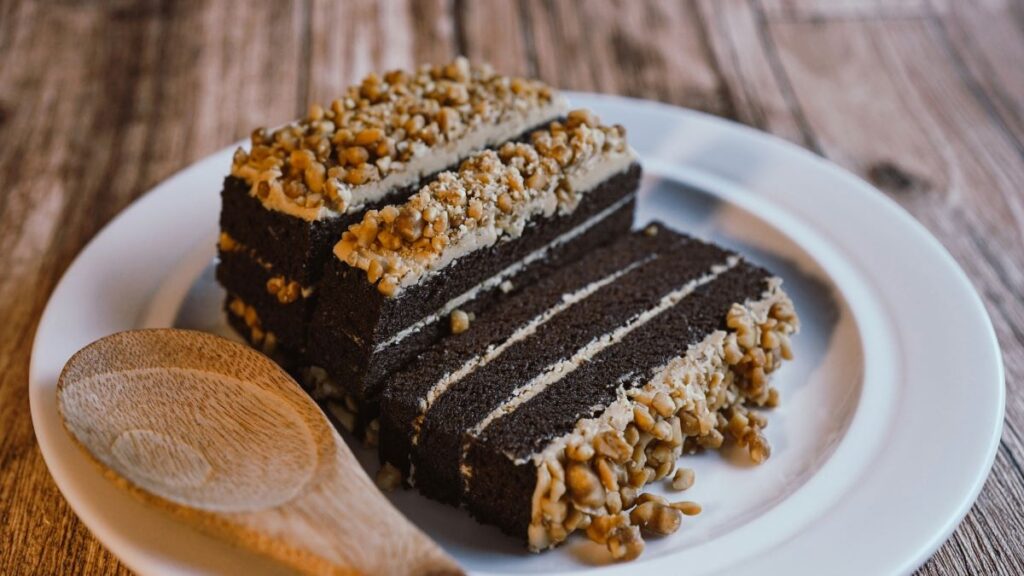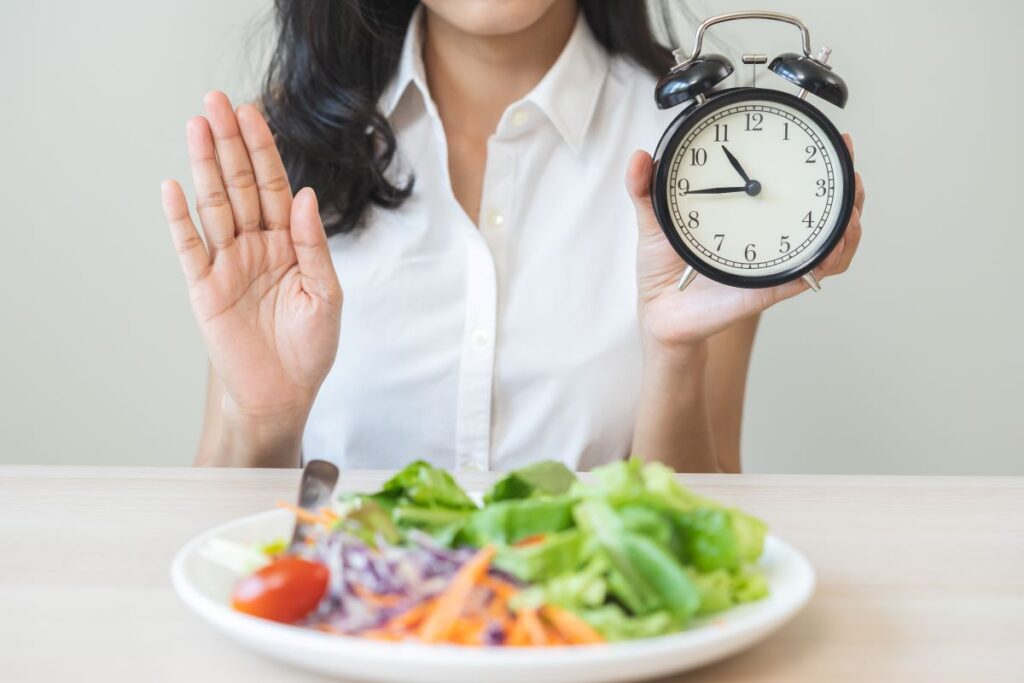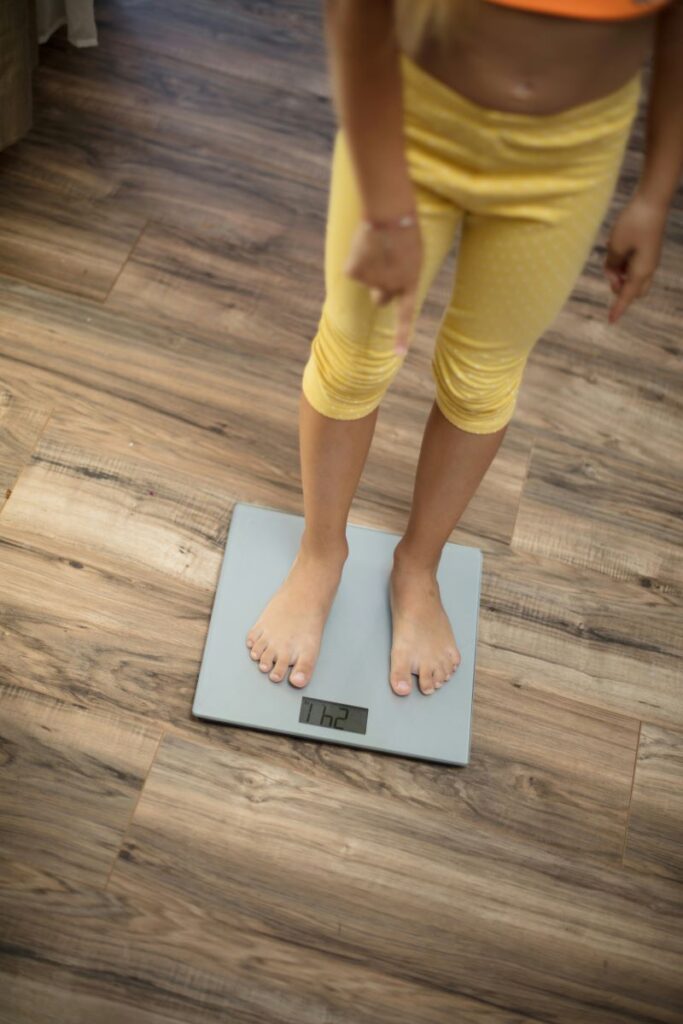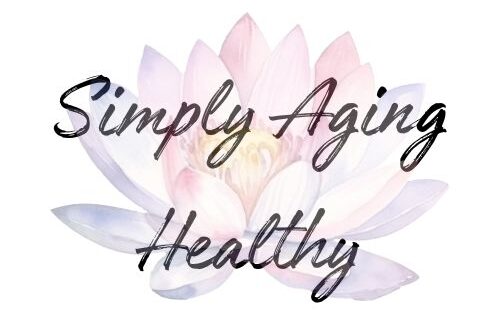Can You Really Eat Whatever You Want While Doing Intermittent Fasting and STILL Lose Weight?
I have always been a “grazer” when it comes to eating.
Since I eat small meals and snacks, I tend to eat constantly!
It didn’t take me long to realize that I was eating way too many calories throughout the day.
I tried dieting, but that really didn’t work. Once I found out I couldn’t eat something, I wanted it even more and usually ate it.
I found out quickly that dieting was not for me.
So, after a little trial and error, I found intermittent fasting, which was a huge lifesaver for me.
I was still able to “graze” if I wanted to, but it made me put a limit on how long I could graze.
But then I started to wonder, can I really eat whatever I want during my eating window and still lose weight?
The quick answer was a big NO. I could not eat anything if losing weight was my goal.
Cake and candy bars still have the same calories and sugar content.

So, even though intermittent fasting limited my eating window, I still had to be careful about what I ate during my eating periods.
Don’t get me wrong—I still eat some of my favorite, not-so-good-for-me treats (because I don’t believe in dieting), but I still have to balance this with healthy food choices if I’m trying to keep my weight under control.
So, I thought I would share some of the tips and personal experiences I’ve learned about keeping a balance between freedom and mindful eating since starting my intermittent fasting journey.
Basics of Intermittent Fasting
Intermittent fasting (IF) is about when you eat, not necessarily the number of calories that you eat.
It’s all about time-restricted eating with a fasting period, which can help with weight management.
There are several different methods of intermittent fasting.
- 16/8 Method: Fast for 16 hours and eat within an 8-hour window or whatever hours you choose.
- 5:2 Diet: Eat normally for five days a week and restrict calories (about 500-600) on two non-consecutive days.
- Eat-Stop-Eat: Involves a 24-hour fast once or twice a week.
My method of choice is 14/10. I fast for 14 hours and eat for 10 hours.
My hours of fasting are 8:00 PM—10:00 AM, So my last meal or snacking is no later than 7:30 – 8:00 PM.
During my periods of eating, I try to focus on healthy foods.
Sometimes, it’s tempting to think I can eat anything, but I know that a balanced diet is the best way to go if I want to keep my weight in check.
READ MORE: The Pros And Cons Of Intermittent Fasting For Women Over 60 | Simply Aging Healthy

Nutrition and Intermittent Fasting
I found that nutrition is a huge factor when considering intermittent fasting, especially if weight control or weight loss is your goal.
If you have a history of an eating disorder, then intermittent fasting is probably not for you.
However, if you are just trying to keep your eating in check—like me—intermittent fasting can be a great option.
To be successful, you do need to pay attention to macronutrients and micronutrients.
Here’s a simple breakdown:
- Proteins: Aim for lean protein like chicken, fish, or plant-based options for muscle growth.
- Carbohydrates: Focus on complex carbs like whole grains, fruits, and vegetables, which are an energy source.
- Fats: Include healthy fats, like avocados and nuts. Fats are important for tissue growth, hormone production, and healthy skin – just to name a few!
READ MORE: Should You Avoid Fats In Your Diet? | Simply Aging Healthy
Micronutrients like vitamins and minerals are also important in order to stay healthy and keep your body going strong.
READ MORE: Micronutrients: Types, Functions, Benefits and More (healthline.com)
Weight Loss Dynamics
Understanding how weight loss works is super important when you are considering starting on an intermittent fasting journey.
Calories In vs. Calories Out
The key to weight loss is as simple as consuming less calories than you burn: Calories In vs. Calories Out.
You’ll lose weight if you take in fewer calories than you burn.
Intermittent fasting is helpful because it restricts the amount of time I eat.
Since my eating window is 10:AM to 8:00 PM, I have less time to snack between my 3 meals.
There are apps that can help you track your calorie intake if that’s your thing. I don’t do so well with this.
I have found that I either become obsessed with it or forget to do it. It’s always one extreme to the other, so I don’t bother with this.
I just chose to make healthy eating choices.
Role of Diet Quality
While calories matter, they’re not the whole story.
The quality of the food that you eat is very important.
Eating healthy, nutrient-dense foods like fruits, vegetables, lean protein, and whole grains helps me feel fuller for longer, making it easier to stick to my fasting schedule.
On the flip side, if I eat processed foods, I find myself eating more calories than I need without feeling satisfied.
How Food Choices Affect Weight Loss
Choosing what I eat plays a big role in my weight loss journey during intermittent fasting.
By learning how different foods impact my metabolism and hunger, I can better shape my eating plan to meet my goals.
Impact on Metabolism
Selecting whole, nutritious foods in your eating plan can boost your metabolism.
Foods loaded with protein need more energy to digest, which can up your calorie burn.
Opt for lean meats, beans, and dairy because these help keep muscle while losing weight.
On the other hand, eating junk food like refined sugars and high-fat processed snacks can slow metabolism.
These foods offer little nutrition and can make you feel tired, making it tough to stay active.
Balancing your diet with healthy fats and fiber can help your metabolism work better.
By paying attention to the type and amount of food you eat, you can maintain a healthy weight and feel more energetic.

Long-Term Considerations
I’ve learned that what works in the short term might not work in the long term.
If I eat whatever I want during my eating window, it can lead to burnout or a negative relationship with food.
Here are a few tips that can help:
- Plan Meals: I find that planning meals ahead of time decreases impulse eating
- Moderation is Key: Instead of being extreme, focus on moderation. Enjoy treats occasionally so you don’t feel deprived.
- Listen to Your Body: Paying attention to hunger cues is important. This can help you avoid overeating or undereating.
Making these choices feel less like a diet and more like a lifestyle.
Can You Eat Anything and Lose Weight on an Intermittent Fasting Plan?
While intermittent fasting does give you a certain level of flexibility in your food choices, you need to remember that quality still matters.
Including healthy foods in your meals will support your weight loss goals and improve your overall health.
As the saying goes, “You are what you eat.” So, make sure to nourish your body with the right fuel.
To quote a study from the American Journal of Clinical Nutrition, “A healthy diet is essential for effective weight loss, even with intermittent fasting.”
With that in mind, let’s continue this journey towards a healthier lifestyle together, one bite at a time. So go ahead and enjoy your favorite foods in moderation, but be sure to prioritize healthy food choices.
Together, we can make lasting changes and achieve our weight loss goals while also satisfying our cravings.
Have you found an eating pattern that suits you? I would love to hear your story!
